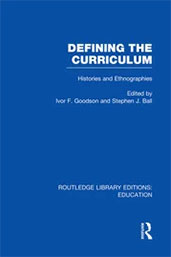Defining the Curriculum: histories and ethnographies
Subjects for Study: towards a social history of curriculum
The fears which geographers expressed so strongly and emotionally about the emergence of environmental studies were not shared to the same degree by biologists. As we have seen, only the field biology sub-group was threatened and they managed to expand into the growing territory of field studies. However, in the negotiations at Schools Council the science sub-committee, which included a number of biologists, joined forces with the geographers in their opposition to the environmental studies A-level. In both sub-committees 'concern was expressed at the heavy overlap between this syllabus and syllabuses in both geography and biology.' The pursuance of this allegation involved a clever strategy. First, the committees argued that the A-level must delete 'irrelevant topics' not related to geography or biology. Then the committees stated that 'if irrelevant topics were envisaged as removed, the effect would be to reveal how close the resulting syllabus would be to existing syllabuses in geography and to a less extent biology' (Herts File SS/L/G/191).
A judgement from Sean Carson that the Schools Council sub-committees 'jealously guarded the preserves of their subject' was confirmed by the comments from the geography sub-committee when the decision on the A-level was finally announced. They were plainly fairly satisfied with their territorial defense and 'noted with approval that candidates could not take this examination together with geography'. A final point was added that there was 'as yet no indication that universities would be prepared to accept a pass in this subject as an entry qualification for degree courses' (ibid). The restriction on environmental studies being offered with geography, together with an initial restriction to a five-year 'experimental' period and t~ a limited number of schools, placed enormous practical obstacles in the way of any widespread adoption of the subject. By ensuring these obstacles faced the new subject in the early years, when the momentum for change was strong, the opponents of the new subject effectively extinguished its chances of establishment in the secondary school curriculum.
Examining Theory: An Example
Since we began by instancing the non-use or misuse of history by sociologists who contributed to Knowledge and Control it would be instructive to examine their theories with respect to school subjects. This way we can examine an earlier contention that 'to seek to provide from the macro-level theories of curriculum without empirical investigation or understanding of how the curriculum has been negotiated at micro-level over time is a poor sequence through which to proceed to theory' (Goodson, 1976).
